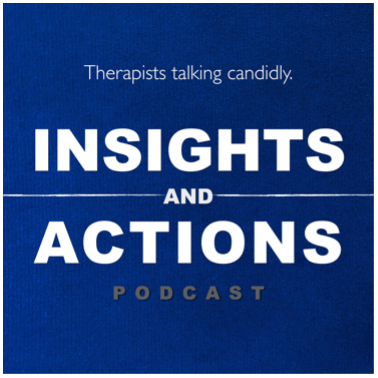Cyndi Turner's Blog, page 6
November 1, 2023
5 Couples Therapy Activities for Fall
Couples therapy is an effective way to improve relationships and promote a healthy connection. Therapy sessions help couples identify underlying issues and work through them together under the guidance of a trained therapist. Couples therapy activities and exercises can strengthen your relationship and improve your mental health during the fall and throughout the year.
At Insight Into Action Therapy, we offer a range of couples therapy activities, exercises, and interventions specifically designed to help couples strengthen their relationship and improve their emotional connection. Call 703.935.8544 today to learn how we can help you and your partner rebuild your bond.
5 Couples Therapy Activities for FallCouples therapy activities could be an excellent option to strengthen your relationship this fall. There are many benefits to taking part in couples therapy, including increased communication, improved intimacy, and more trust. The following couples therapy activities can help to deepen your connection and create a stronger, more satisfying partnership.
1. Go for a HikeFall is the perfect time to get out and enjoy nature. Research shows that spending time in natural environments can help reduce stress and improve mood. Going for a hike with your partner can be a great way to reconnect and enjoy each other’s company while enjoying the season’s beauty.
2. Cook a Meal TogetherCooking a meal together can be a fantastic way to bond. Not only is it a shared experience, but it also allows for plenty of time to talk and connect without outside distractions. Consider trying a new recipe or picking up some fall-themed ingredients to make the experience even more special.
3. Take a Dance ClassDancing is a fantastic way to get your body moving and improve your mood. Couples who take dance classes together often report feeling more connected and intimate. You will have a great time opting for a traditional ballroom class or something more modern like salsa or swing.
4. Practice Mindfulness TogetherMindfulness practices like meditation and deep breathing can reduce stress and improve mental health. Consider incorporating these practices into your time together as a couple. Simple techniques like taking a few deep breaths or practicing a 10-minute guided meditation can help create a sense of calm and relaxation.
5. Write Love Letters to Each OtherWriting a love letter can be a powerful reminder of your connection and love for each other in a world that can often feel rushed and chaotic. Consider setting aside some time to write letters to each other, expressing your feelings and appreciation for your partner. You can exchange the letters at a later date or even read them to each other out loud for an added level of intimacy.
Benefits of Couples Therapy ActivitiesParticipating in couples therapy activities can have many benefits for your relationship. Regularly engaging in shared experiences can help to deepen your connection and improve your communication and understanding. Activities like meditation and dance can also help reduce stress and improve your emotional well-being, which can positively impact your relationship.
Couples Therapy ExercisesCouples therapy exercises help couples better understand each other’s needs and perspectives. These exercises range from simple communication to more complex ones requiring deeper introspection. At Insight Into Action Therapy, we offer various couples therapy exercises tailored to meet each couple’s unique needs.
Contact Insight Into Action for Couples Therapy TodayCouples therapy activities could be an excellent place to start if you’re struggling in your relationship or looking to deepen your connection. At Insight Into Action Therapy, we specialize in helping couples improve their relationships through various therapeutic techniques and activities. Contact us today at 703.935.8544 or online to learn more about our services and how we can help you and your partner grow closer together.
The post 5 Couples Therapy Activities for Fall appeared first on Insight Into Action Therapy.
October 30, 2023
Introducing the Insights and Actions Podcast
Have you ever wanted to hear what therapists really talk about when they’re out of session? The new podcast Insights and Actions allows you to do just that. Insights and Actions are candid conversations with Insight Into Action Therapy and Insight Recovery Centers’ clinical team.
The first episode, out now, is “The Problem of Overindulged Kids” featuring Craig James, LCSW, LSATP, MAC, Matt Christian, LCSW, and Johnny Pierce, PhD.
Overindulgence can take the form of too much stuff, soft structure, and over-nurturing. Though often with the best intentions, overindulgence can contribute to a lack of resilience and confidence, increased anxiety, and eventually failure to launch. Identifying these behaviors is important. However, real change can happen when we move beyond the “what?” to the “why?” Hear Craig, Matt, and Johnny discuss how they see this play out with families in the therapy office, the underlying reasons many parents may be overindulging their kids, and how to begin to make changes.
Insights and Actions can be found on YouTube, Spotify, Apple podcasts, Amazon music, and Audible.





If you would like a free consultation with a therapist at Insight Into Action Therapy, please contact us!

The post Introducing the Insights and Actions Podcast appeared first on Insight Into Action Therapy.
October 23, 2023
Winter Blues – SAD Overview
As the days grow shorter and the air becomes colder, many people experience a shift in their mood and energy levels. For some, this seasonal change can lead to a condition known as seasonal affective disorder (SAD). SAD is a type of depression that typically occurs during the fall and winter months, leaving individuals feeling lethargic, sad, and disinterested in activities they once enjoyed. In this blog post, we’ll delve into the intricacies of seasonal affective disorder, exploring its causes, symptoms, and available treatments.
Understanding Seasonal Affective DisorderSeasonal affective disorder is often referred to as the “winter blues” or “winter depression” because it tends to manifest during the darker, colder seasons. While it shares some similarities with major depressive disorder, SAD is unique in its seasonality. Experts believe that the reduced exposure to natural sunlight plays a significant role in the development of SAD.
The Role of LightOne of the leading theories about the cause of SAD relates to the body’s internal clock, or circadian rhythm. Reduced exposure to daylight during the fall and winter months can disrupt this delicate balance, leading to changes in sleep patterns, mood, and appetite. This disruption may also affect the production of serotonin, a neurotransmitter associated with mood regulation, leading to depressive symptoms.
Common SymptomsThe symptoms of SAD can vary from person to person, but common signs include:
Persistent feelings of sadness or hopelessnessFatigue and low energy levelsDifficulty concentrating and making decisionsChanges in appetite, often leading to overeating and weight gainOversleeping or difficulty falling asleep (hypersomnia)Those struggling with SAD may also withdraw from social activities and experience a decreased interest in hobbies.
Diagnosis and TreatmentIf you suspect you or someone you know may be experiencing SAD, it’s crucial to seek professional help. A healthcare provider can evaluate your symptoms, rule out other potential causes, and determine the most suitable treatment plan. Treatment options for SAD may include:
Light therapy – Light therapy involves the use of a specialized lightbox that emits bright white light. Mimicking natural sunlight can help alleviate SAD symptoms.Psychotherapy – Talk therapy, such as cognitive-behavioral therapy (CBT), can provide coping strategies and support for managing SAD.Medication – In some cases, antidepressant medications may be prescribed to help alleviate symptoms.Additionally, incorporating regular exercise, maintaining a healthy diet, and managing stress can all contribute to symptom relief.
Contact Insight Into Action Today for Depression TreatmentSeasonal affective disorder is a real and treatable condition that affects millions of people around the world. As the winter months approach, it’s essential to be aware of the potential onset of SAD and seek help if needed. With the right treatment and support, individuals with SAD can regain their energy, enthusiasm, and quality of life, even during the darkest and coldest days of the year.
The Insight team is here to help. Give us a call 703.935.8544 or visit us online to get started.
The post Winter Blues – SAD Overview appeared first on Insight Into Action Therapy.
September 14, 2023
Insightful Pathways: Navigating Recovery Together at the Loudoun Recovery Festival 9/16
The Loudoun Recovery Festival brings together individuals, families, and communities affected by addiction and recovery. On September 16th, during National Recovery Month, the festival celebrates recovery progress made by community members. This event provides an excellent opportunity for attendees to learn more about the addiction and recovery services Insight Into Action Therapy offers. We encourage everyone to come out and join us for this inspiring day.
Contact Insight Into Action Therapy at 703.935.8544 or online for more information on how to become involved in our recovery community.
Insightful Pathways September IssueThe post Insightful Pathways: Navigating Recovery Together at the Loudoun Recovery Festival 9/16 appeared first on Insight Into Action Therapy.
September 13, 2023
What’s the Difference Between MAT and MOUD?
Medication-assisted treatment (MAT) programs have become popular for treating opioid use disorder. What’s the difference between MAT and MOUD? MAT programs involve medications, counseling, and behavioral therapies to treat substance use disorders. In contrast, medications for opioid use disorder (MOUD) refer to using medication as a stand-alone treatment. Understanding these concepts and their differences is essential for you or a loved one to receive the best treatment.
At Insight Into Action Therapy, we offer a medication-assisted treatment program that combines medications with therapy and counseling to treat opioid use disorder. Our program is tailored to the individual’s unique needs and includes individual and group therapy sessions. We are LGBTQ-friendly and offer nutrition education/counseling as part of our program.
If you or someone you know is struggling with opioid use disorder, don’t wait to get help. Contact Insight Into Action Therapy today at 703.935.8544 to learn more about our MAT program and how we can help you on your journey toward recovery.
What Is MAT?MAT is a comprehensive approach to treat OUD that includes medication and therapy. MAT works by reducing cravings and withdrawal symptoms, and optimizing patient participation in other forms of treatment. It is essential to understand that MAT isn’t a substitute for addiction but a form of treatment.
What Is MOUD?MOUD refers to any medication used specifically to treat OUD. This medication can be used as part of MAT or as a stand-alone treatment. The medications used for MOUD such as buprenorphine, methadone, or naltrexone work by suppressing withdrawal symptoms and reducing cravings. These benefits can increase patient participation in other forms of treatment.
Differences Between MAT and MOUDMAT and MOUD are often used interchangeably, but they are different concepts. The former includes medication-assisted treatment and psychotherapy, while MOUD only involves medication use. MAT can be seen as an umbrella term encompassing MOUD. In MAT, the medication used is not the only treatment method employed, while MOUD relies solely on medication to treat opioid use disorder.
An essential factor that sets MAT apart from MOUD is its comprehensive approach to treating SUDs. MAT reduces cravings and withdrawal symptoms and helps build coping mechanisms and life skills to maintain abstinence. MAT is more effective when combined with counseling and behavioral therapies, providing a holistic approach to treating opioid use disorder.
On the other hand, MOUD as a stand-alone treatment may not address the underlying issues that lead to opioid use disorder. Patients using MOUD may need to continue using it for extended periods of time, whereas MAT may be used for shorter periods.
How Insight Into Action Therapy Can HelpAt Insight Into Action Therapy, we strive to provide comprehensive care to our clients with SUDs. We offer both medication-assisted treatment and stand-alone medication options. Our clinicians work with clients to determine the best course of treatment for them. The MAT program utilizes medication, counseling, and psychotherapy techniques such as motivational interviewing, cognitive-behavioral therapy, and dialectical behavior therapy.
We also offer MOUD stand-alone treatment options to achieve withdrawal and maintenance of abstinence. Our MOUD stand-alone options include buprenorphine and naltrexone.
We provide a safe and supportive environment for clients to recover from OUD and other SUDs. Our clinicians ensure that clients receive the right treatment options while maintaining confidentiality and respect for their privacy.
Enroll in MAT or MOUD Today at Insight Into Action TherapyIf you or a loved one is struggling with opioid use disorder, please contact us today to start on the path toward recovery. We use a comprehensive approach to treatment that to help you or your loved one achieve a successful recovery. Our team of expert clinicians is here to help, so please don’t hesitate to reach out. Contact us today at 703.935.8544 or online to take the first step toward recovery.
The post What’s the Difference Between MAT and MOUD? appeared first on Insight Into Action Therapy.
August 21, 2023
What Are Toxic Relationships While in Recovery?
Addiction is never just about one person. Whether it be an addiction to drugs, alcohol, or destructive behavior patterns, it affects everyone around them. Relationships that involve addiction can be incredibly toxic, especially when the other party is trying to achieve sobriety or experiencing addiction recovery. Understanding toxic relationships, addiction in relationships, addiction behavior patterns, and relationship repair counseling is vital.
At Insight Into Action Therapy, we offer various counseling services for individuals who struggle with addiction and toxic relationships. Our team of experienced therapists approaches therapy holistically, incorporating evidence-based techniques to help clients achieve lasting recovery. If you or a loved one is struggling with addiction and toxic relationships, don’t hesitate to contact us today at 703.935.8544. Our team is here to help you navigate the challenges of recovery and establish healthy relationships and boundaries that support your long-term success.
Toxic Relationships ExplainedA toxic relationship drains, exhausts, and negatively affects one’s physical and mental state. These relationships can occur anytime, anywhere, and with anyone, including family members, partners, and friends. People in toxic relationships often feel trapped and believe they have no option but to stay in it. They typically involve power struggles, manipulation, and passive-aggressive behavior. Toxic relationships can influence recovery by leading to relapse, depression, and anxiety. They can also cause serious emotional and long-term damage to one’s mental well-being.
Addiction in a RelationshipAddiction in a relationship can add an extra layer of complexity. It requires a committed, empathetic partner who understands what addiction is and what recovery requires. Addiction often contributes to codependency, where the partner enables the addiction through multiple means.
In contrast, the other partner heals from their addiction. The codependent person tends to put their partner’s needs before their well-being, resulting in the deterioration of the relationship. Addiction in relationships can lead to behaviors such as mistrust, lying, and major breakdowns in communication. It can escalate to verbal or physical violence that can harm both parties.
Addiction Behavior PatternsAddiction behavior patterns typically manifest in specific ways. Triggers are usually related to a person, place, time, or situation that pushes the individual toward addiction. They can be positive or negative and often involve experiencing highly stressful situations. For some people in recovery, vulnerability and resulting triggers are the main causes of addiction. For example, a person with unsupportive or manipulative partners, experienced trauma, low self-esteem, or depression is significantly more vulnerable to addiction. A positive triggering event, such as sudden success, can also lead to the addiction cycle due to heightened stress levels and anxiety.
Benefits of Relationship Repair CounselingIt is possible to repair most relationships damaged by addiction. Still, it requires both parties’ patience, dedication, compassion, and willingness to make it work. Couples counseling in recovery can work wonders for those who desire to break the vicious cycle of addiction in a relationship. Relationship repair counseling is a form of therapy that involves couples learning healthier communication skills, identifying and correcting problematic behaviors, discussing past traumas, and setting healthy boundaries.
Repair Relationships with Help From Insight Into Action TherapyAt Insight Into Action Therapy, everyone can benefit from therapy. We are a team of experienced and compassionate professionals dedicated to helping our clients achieve their mental health and wellness goals. Our therapy programs are uniquely tailored to meet each client’s needs and cover various mental health issues. Services include different therapy types such as person-centered therapy, psychotherapy, and medication-assisted therapy.
Our team of compassionate professionals can help you restore your relationships, recover from addiction, and achieve your wellness goals. We are LGBTQ+ friendly, and our services are available in our Northern Virginia offices or via teletherapy.
Contact Insight Into Action Therapy today at 703.935.8544 or online and let our trained professionals help you repair your relationship and support your addiction recovery journey.
The post What Are Toxic Relationships While in Recovery? appeared first on Insight Into Action Therapy.
August 7, 2023
How to Repair Relationships After Addiction
Addiction and recovery can often take a toll on relationships. The overwhelming emotions, irregular behavior, dishonesty, and neglect can leave long-lasting scars. However, it is never too late to start mending those relationships and start anew. Relationship repair counseling, psychotherapy, and support groups can assist in developing strategies to repair damaged relationships.
Insight Into Action Therapy provides reliable and efficient support to individuals and couples who require support to repair their relationships after addiction recovery. Our specialized therapists will offer guidance to help you navigate this difficult phase and support you. If you need assistance or advice regarding rebuilding your relationship after addiction, please seek support at 703.935.8544. Our team is here for you.
How to Repair Relationships After AddictionIf you or your partner has recently gone through addiction and recovery, it is crucial to understand that repairing a relationship is a process that takes effort and dedication. Here are some crucial steps that you can take to rebuild your relationship after addiction:
Acknowledge the pain – Start by acknowledging the hurt caused during addiction and recovery. Expressing empathy and listening carefully to the other person’s feelings can go a long way in rebuilding trust and intimacy.Communicate effectively – Communicate openly and transparently about feelings and emotions. Encourage your partner or loved one to do the same. Practice active listening by showing respect and understanding their perspective.Practice forgiveness – Forgiveness is a crucial step in the healing process. Forgiving yourself and others, letting go of the pain, and moving forward is important.Rebuild trust – Trust is a central component of any relationship. The path toward trust-building may be long and complicated, but it’s important to remain committed. Demonstrate reliability, dependability, and a willingness to be transparent in your actions and words.Create boundaries – Create healthy boundaries and recognize triggers that could harm the relationship. Don’t be afraid to communicate the need for space or distance when necessary.Benefits and Challenges of Dating Someone in RecoveryFinding love after addiction or dating someone in recovery can be a unique and challenging experience but also incredibly rewarding. Individuals in recovery have a profound depth of understanding about the damaging effects of addiction and value the support and love they receive. Here are some of the benefits of dating someone in recovery:
Emotional depth and honesty – Individuals in recovery have a heightened sense of self-awareness and emotional maturity which can allow for honest communication and a more profound connection.Support and understanding – Dating someone in recovery can provide additional support and understanding because addiction or mental health issues have impacted both individuals.Shared experiences – Shared experiences with addiction and recovery can strengthen the bond between couples, providing common goals and deep companionship.However, there are also challenges to consider when dating someone in recovery. One of the main challenges is that addiction is a lifelong disease, and recovery is a continuous process. Moreover, there may be triggers or stressors that could potentially harm the relationship and cause setbacks. It’s important to maintain open communication and set healthy boundaries.
Start Relationship Repair Counseling Today at Insight Into Action TherapyAt Insight Into Action Therapy, we understand the complexities of addiction and its impact on relationships. We provide the necessary tools and support to make this process easier. Together, we can help rebuild healthy and supportive relationships that mutually enrich lives.
We offer various services such as relationship repair counseling, neurofeedback, psychotherapy, and medication-assisted treatment. Our compassionate and client-centric care helps individuals and couples improve their relationships and strengthen their resilience. Contact us today at 703.935.8544 or online to learn more about how we can help.
The post How to Repair Relationships After Addiction appeared first on Insight Into Action Therapy.
July 27, 2023
Policy Brief: Cannabis Use & Impaired Driving
Changes to cannabis laws increase rates of driving under influence of cannabis & fatal car crashes
Public Health ConcernIMPACT ON DRIVINGDriving under the influence of cannabis (DUIC) should be a priority public health concern. Research shows DUIC impairs drivers’ performance and increases risk of crash (Rameks, 2018). The following areas are impairment by cannabis use (CU):
Psychomotor Speed Visual ProcessingExecutive FunctionCoordination & motor skillsWorking MemoryMulti-TaskingLane TrackingDUIC affects coordination, reaction time, attention, judgment and impairs cognition necessary for safe driving (eg. resulting in slower reaction times). Motor skills decrease which increase the risk of fatal car crashes. CU impairs accurately assessing surroundings and reacting to changes in traffic conditions. This leads to misjudgments in changing lanes, making turns, or maintaining a safe following distance. Reduced inhibitions result in aggressive driving, excessive speeding, taking unnecessary risks on the road. An inability to concentrate on the road, leads to missed traffic signals, failure to notice pedestrians, cyclists and unawareness of potential hazards. Impaired motor coordination makes it difficult to control a vehicle safely. Difficulty maintaining a steady speed, staying within a lane, or performing basic driving maneuvers occurs. All of which result in increased number of accidents and collisions.
 Cannabis Users are more likely to be involved in crashes compared to non-users. And associated with an increased involvement in a car crashes that showed drivers tested positive for cannabis. The number of drivers testing positive for CU and alcohol use (AU) also increased. DUIC and ETG are more dangerous than drivers who consume cannabis alone or ETG alone (Hartman & Huestis, 2013) (NIDA, 2019b).
Cannabis Users are more likely to be involved in crashes compared to non-users. And associated with an increased involvement in a car crashes that showed drivers tested positive for cannabis. The number of drivers testing positive for CU and alcohol use (AU) also increased. DUIC and ETG are more dangerous than drivers who consume cannabis alone or ETG alone (Hartman & Huestis, 2013) (NIDA, 2019b).
The current methods to measure driver impairment are:
Field Sobriety Tests (roadside)Urine Analysis (station)Saliva/oral fluid tests (roadside)Blood Tests (station)Drug recognition experts (DRE) (expensive)CONTRIBUTING FACTORS As rates of DUIC increase with decriminalization and commercialization, so should options for measuring driver impairment. The effects of multiple substances have a synergistic effect on impairment, crash risk, deaths. Measuring impairment is dependent on police recognizing the signs of DUIC. There must be probable cause for an arrest to occur, before an UA or blood test can be collected. Regulation and monitoring is complicated without a way to measure DUIC impairment roadside. Use of DRE and saliva testing is expensive and not used in VA. Methods for measuring impairment aren’t as straightforward as alcohol testing. THC levels and levels of impairment aren’t correlated. Visible behavioral or cognitive effects vary by individual. And can be subtle and context dependent. This makes it difficult to measure objectively. Especially if police do not know what to look out for. Tolerance and frequency of use also vary how impaired a person will present. Cognitive, field sobriety tests, can assess impairment more directly, but are subjective and influenced by multiple factors. And no standardized limits for THC impairment exist. (Adlin, 2023)
As rates of DUIC increase with decriminalization and commercialization, so should options for measuring driver impairment. The effects of multiple substances have a synergistic effect on impairment, crash risk, deaths. Measuring impairment is dependent on police recognizing the signs of DUIC. There must be probable cause for an arrest to occur, before an UA or blood test can be collected. Regulation and monitoring is complicated without a way to measure DUIC impairment roadside. Use of DRE and saliva testing is expensive and not used in VA. Methods for measuring impairment aren’t as straightforward as alcohol testing. THC levels and levels of impairment aren’t correlated. Visible behavioral or cognitive effects vary by individual. And can be subtle and context dependent. This makes it difficult to measure objectively. Especially if police do not know what to look out for. Tolerance and frequency of use also vary how impaired a person will present. Cognitive, field sobriety tests, can assess impairment more directly, but are subjective and influenced by multiple factors. And no standardized limits for THC impairment exist. (Adlin, 2023)
 The state of VA should learn from the impact of other states’ changes to cannabis laws. Rates of traffic fatalities in Colorado (CO) has risen to 1 in 4 deaths that involve MJ (CO DOJ, 2020) since legalization in 2014. Traffic fatalities with drivers testing positive increased from 55 deaths in 2013 to 115 deaths in 2018. In 2018, 18.2% of all traffic fatalities in CO involved a driver who tested positive for MJ. (Graph R). Reports by AAA found after legalization in Washington state the number of drivers in fatal crashes who tested positive for MJ doubled (graph below). The legalization of recreational MJ in Colorado, Oregon, and Washington coincided with an increase in collision claims (Highway Loss Data Institute, 2018).
The state of VA should learn from the impact of other states’ changes to cannabis laws. Rates of traffic fatalities in Colorado (CO) has risen to 1 in 4 deaths that involve MJ (CO DOJ, 2020) since legalization in 2014. Traffic fatalities with drivers testing positive increased from 55 deaths in 2013 to 115 deaths in 2018. In 2018, 18.2% of all traffic fatalities in CO involved a driver who tested positive for MJ. (Graph R). Reports by AAA found after legalization in Washington state the number of drivers in fatal crashes who tested positive for MJ doubled (graph below). The legalization of recreational MJ in Colorado, Oregon, and Washington coincided with an increase in collision claims (Highway Loss Data Institute, 2018).

States with cannabis legalization have an increase in driving under influence of cannabis (DUIC) and crashes (fatal and non-fatal) (SAM, 2023). We should learn from their experience. By educating and improve our monitoring driver impairment. Standard field sobriety tests aren’t sufficient enough. VA has no quick or reliable device for testing DUIC roadside. And “have failed to create laws setting legalized impairment limit” (SAM, 2023).

To View the full pdf, click here!
The post Policy Brief: Cannabis Use & Impaired Driving appeared first on Insight Into Action Therapy.
July 19, 2023
5 Coping Skills for Anxiety Attacks
Anxiety attacks are a common occurrence for many people. Studies show that anxiety disorders affect tens of millions of adults in the U.S. Anxiety symptoms can range from mild to severe and interfere with daily activities. Fortunately, with practice, one can learn effective coping skills for anxiety attacks to alleviate symptoms and promote wellness.
If you experience anxiety attacks, seeking professional help from a licensed mental health care provider is important. At Insight Into Action Therapy, we offer various services, including anxiety treatment, medication management, and coping skills training. Contact us today at 703.935.8544 to learn more about how we can help.
Symptoms of AnxietyAnxiety is a normal and necessary emotion that helps us respond to danger or stress. However, when anxiety becomes excessive and uncontrollable, it can cause various physical symptoms, including:
Rapid heartbeatSweatingTrembling or shakingShortness of breathNausea or stomach upsetAdditional physical symptoms of anxiety may include dizziness, lightheadedness, and fatigue.
Severe Anxiety SymptomsSevere anxiety symptoms can be debilitating and interfere with daily activities such as work, school, and social events. Some of the more severe symptoms of anxiety include:
Panic attacksIntrusive thoughtsParanoiaAvoidance behaviorIf you experience any of these severe symptoms, it is important to seek professional help as soon as possible.
5 Coping Skills for Anxiety AttacksAnxiety management techniques can reduce the severity of symptoms and promote overall life satisfaction. The following are a handful of coping skills for anxiety attacks.
1. Deep BreathingDeep breathing is a quick and effective way to calm anxiety. When we are anxious, our breathing becomes shallow and rapid. Deep breathing can help slow down our breathing and relax our body. To practice deep breathing, breathe in for four seconds, hold for four seconds, and then exhale slowly for six seconds.
2. MindfulnessMindfulness is the practice of being present in the moment and aware of your thoughts and feelings without judgment. It can help reduce anxiety by keeping our focus on the present and preventing us from dwelling on the past or worrying about the future. To practice mindfulness, find a quiet place to sit or lie down and focus on your breath. When your mind wanders, gently bring it back to your breath without judgment.
3. Physical ExercisePhysical exercise is a great way to reduce anxiety and stress. Exercise releases endorphins, which are natural mood boosters. It also helps reduce muscle tension and improves sleep, which can all help reduce anxiety. To start, try going for a short walk or doing a few stretches at home.
4. Self-TalkSelf-talk is a way to reframe negative thoughts into positive statements. When we are anxious, our thoughts can become negative and distorted, worsening our anxiety. Self-talk can help us challenge these negative thoughts and replace them with positive statements. To practice self-talk, write down negative thoughts and reframe them into positive statements.
5. Progressive Muscle RelaxationProgressive muscle relaxation is a technique that involves tensing and relaxing different muscle groups in the body to reduce muscle tension and promote relaxation. To practice progressive muscle relaxation, find a quiet place to lie down. Tense and relax every muscle group, starting with your toes and working your way up to your head.
Anxiety Management TechniquesLearning coping skills is essential in managing anxiety, but other techniques can help manage anxiety in the long term. These techniques include:
Mindful meditationCognitive behavioral therapyLifestyle changes, such as reducing caffeine intake and getting enough sleepIn addition to natural remedies, medication management and psychotherapy can help individuals manage anxiety.
Start Anxiety Treatment Today at Insight Into Action TherapyAnxiety attacks are common, but they can be effectively managed with the right coping skills. Insight Into Action Therapy offers various services to alleviate anxiety, including counseling, psychotherapy, medication management, and coping skills training. Contact us today at 703.935.8544 or online to learn how we can help you with anxiety and improve your quality of life.
The post 5 Coping Skills for Anxiety Attacks appeared first on Insight Into Action Therapy.
July 5, 2023
10 Natural Remedies for Anxiety
Anxiety is one of the most common mental health issues affecting people worldwide. It can interfere with daily activities, relationships, and overall quality of life. Fortunately, there are natural remedies for anxiety that can help alleviate symptoms without the need for prescription medication.
At Insight Into Action Therapy, we offer a range of anxiety treatment options for those struggling with anxiety. Our evidence-based techniques and highly trained therapists can help you learn natural ways to relieve anxiety. Contact us today at 703.935.8544 to schedule a consultation and start your path toward a happier, healthier life.
10 Natural Ways to Relieve AnxietyWhen it comes to anxiety treatment, taking a natural approach can promote physical and emotional well-being. The following are 10 natural ways to relieve anxiety.
1. ExerciseOne of the most effective natural remedies for anxiety is exercise. Physical activity releases endorphins, which are natural mood boosters. It can also help distract from negative thoughts and provide a sense of accomplishment. Aim for at least 30 minutes of exercise daily to reap the benefits.
2. Mindfulness MeditationAnother natural way to relieve anxiety is mindfulness meditation. This practice involves being aware of and accepting the present moment without judgment. It can help control racing thoughts and bring peace to the mind. Research has shown that regular meditation practice can significantly reduce anxiety symptoms.
3. Herbal SupplementsCertain herbs, like chamomile and lavender, have calming effects on the body and can help reduce anxiety symptoms. They can be consumed as teas or taken as supplements. Speaking with a healthcare provider before starting any herbal supplements is important.
4. AromatherapyAromatherapy involves using essential oils to promote relaxation and ease anxiety symptoms. For relief, oils like lavender, peppermint, and frankincense can be added to diffusers, bathwater, or topically.
5. JournalingWriting down thoughts and feelings can have a therapeutic effect on the mind. Journaling can help process emotions and identify triggers for anxiety. It’s important to be honest and open in a journal to reap the benefits.
6. Spend Time in NatureBeing in nature can have a calming effect on the mind and body. Go for a hike, picnic in the park, or sit by a body of water to de-stress and decrease anxiety levels.
7. YogaYoga combines physical movement with mindfulness and controlled breathing, making it a powerful natural remedy for anxiety. It can help reduce cortisol levels, the hormone responsible for the body’s “fight or flight” response.
8. AcupunctureAcupuncture is an ancient Chinese practice that involves inserting thin needles into specific points on the body. It can alleviate anxiety symptoms by releasing endorphins and reducing stress levels.
9. DietA healthy diet can have a significant impact on anxiety levels. Eating foods rich in omega-3 fatty acids, like salmon and walnuts, can help reduce inflammation and improve mood. Consuming probiotics, like those found in yogurt, can also benefit mental health by promoting healthy gut bacteria.
10. SleepGetting adequate sleep is crucial for anxiety management. Lack of sleep can cause an increase in cortisol levels and make it more difficult to manage symptoms. Aim for seven to nine hours of sleep per night and establish a consistent bedtime routine.
Find Anxiety Treatment Today at Insight Into Action TherapyAt Insight Into Action Therapy, we understand the complexity of anxiety. Our highly trained professionals offer various services, including addiction treatment, medication management, and mental health care. We believe in taking a holistic approach to treatment, incorporating natural remedies and evidence-based practices.
If you are struggling with anxiety, contact us today to schedule an appointment with one of our mental health professionals. We can help you manage your symptoms and improve your overall quality of life. Don’t let anxiety control you any longer. Call 703.935.8544 or complete our online form to get started today.
The post 10 Natural Remedies for Anxiety appeared first on Insight Into Action Therapy.



